The winner of the random drawing for a copy of Proteinaholic is Cynthia Scott. Thank you to everyone who shared their thoughts and entered the giveaway, and congratulations to Cynthia!
Buried in the back of my closet…
…is a stack of decades-old food journals with the strained remnants of the days when I was tracking the macros a la The Zone Diet – carbs, fat, and protein – in some hair-brained “ideal” proportion in my quest to somehow achieve the perfect weight.
Not only was this a terrible (and hunger inspiring) way to live, if I knew then what I know now about the downfalls and dangers of building our plates around protein, I would not be in such haste to elevate the status of protein as I did then.
As a matter of fact, from what we now know, the protein pedestal is on a decided tilt – and the madness of our quest for more and more of it is the number one thing I learned in Plant-Based Nutrition Certification school. Perfect timing for a new book to emerge to shed more light on the pitfalls of excess protein. Enter Proteinaholic by my friends in the plant-based posse Garth Davis, M.D.
Read on to find out more about this breakthrough book – and how to enter to win a copy of your own.
Proteinaholic
Proteinaholic illuminates the dark corners surrounding our obsession with “protein – and more of it!” Released October 6, 2015 – just a couple of weeks after The Plant-Based Journey – this is one resource I would loved to have referenced in Journey’s bibliography. If Journey got your obsessed-with-protein cage rattled, Proteinaholic is your next read.
Protein and the health halo effect
Protein is everywhere. Big deal . So what’s the problem? In a word, confusion. Some of us eat protein to lose weight. while others lose protein to gain weight. Ponder that paradox for a second. ~ Proteinaholic, pg. 4
Author Davis – an admitted former proteinaholic – explodes one protein myth after another in this deeply-documented, heavily researched piece of work. Starting with his own personal story of health challenges, his quest to pound down more protein through the years in his own misguided attempts at building strength and personal health, and moving on to his own moments of awakening surrounding protein and nutrition in general, we get all the intimate details of Davis’ personal protein journey.
As a bariatric surgeon, Davis has keen interest in helping people achieve ideal weight and ideal health. Previously a self-confessed protein-monger, Davis now advises his patients to switch to whole foods plant-based nutrition, and make a decided move away from compartmentalizing foods into macro-nutrients. He advises them that the quest to eat more protein to lose weight is actually a big part of their weight – and overall health – problem.
And he explains why.
From Paleo to High Blood Pressure
Davis and Jacobson answer all the questions and will undoubtedly startle you with deeply documented facts about the connections between protein and your health as they address one after another protein and Paleo, diabetes, blood pressure, heart disease, cancer, weight challenges, and the thermogenic effects of protein (not the help-you-lose-weight holy grail you might have heard it to be). And that’s just for starters.
These topics are well-organized into these chunks of book content in Proteinaholic:
- Garth Davis, Proteinaholic: Davis’ personal history
- How We Became Proteinaholics: why and how we all bought into the protein myth
- Death and Disease by Protein: complications from eating too much animal protein
- The Proteinaholic Recovery Plan: suggested pathway for disentangling yourself from the protein problem and plant your meals accordingly
Also, Davis and Jacobson have more resources and bonus gifts for you at proteinaholic.com. Check it out.

Howard Jacobson, PhD. collaborative writer to Proteinaholic and co-author of Whole also coauthored the Preface to The Plant-Based Journey.
Wishlist
I’m very happy to have Proteinaholic as such a rich reference as I move forward on my own journey of sharing the power of plant-based nutrition. Yet if there were one wish I have about Proteinaholic it is that there were an index in the back of the book. On a work as targeted as this, with specific points to review when questions come up, having an index at the back would make searching topics much easier. Also, during the first portions of Proteinaholic, I kept wishing that the facts presented and statements made were referenced with an end note number. Then, further into the manuscript, facts and figures started to be annotated with specific studies by listing names and dates of research papers as in (name, name, date). This helped as then I could find the specific references in the back, though my preference is use of end note numbers so that reading a list of names doesn’t interfere with the flow of written content. That’s my wish list for the second edition!
Enter the Giveaway
To win a copy of Proteinaholic (U.S. and Canada only), enter the giveaway in this easy fashion.
In comments below, respond to this question:
Can you name a time in your life that you have been over-zealous about protein? If so, share what started to change your mind about eating excess protein – and if this is the first you’ve heard about the problems of protein, then share that below!
The winner will be randomly selected on October 13, 2015.
Can’t wait to hear your thoughts on the protein problem!

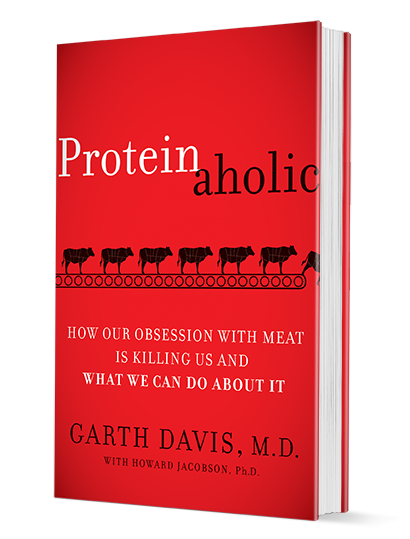
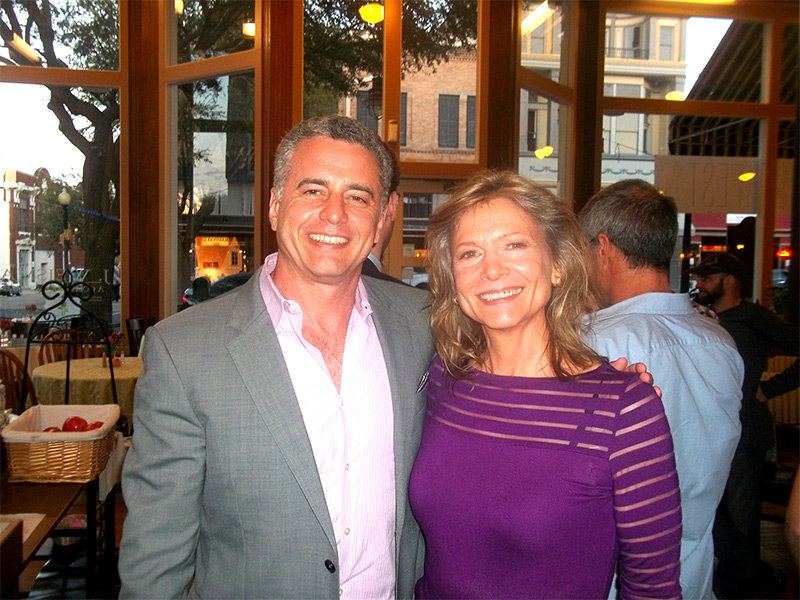
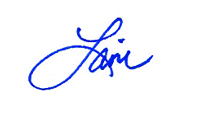
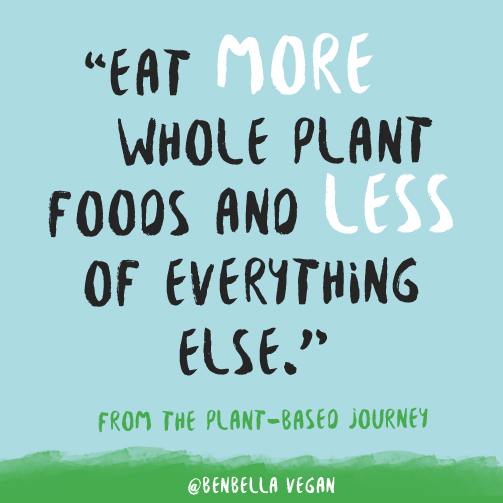
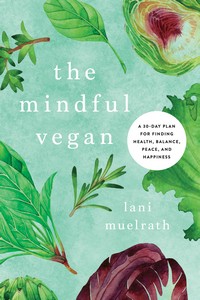
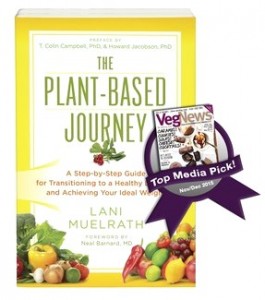
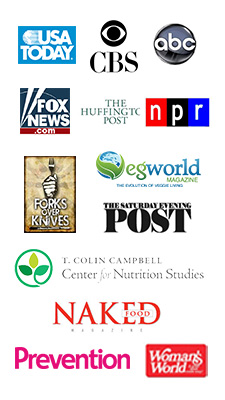
I have been encouraged to eat more protein by doctors – when I was pregnant, when I needed to lose weight, and when my cholesterol was too high. Increasing protein did not help with any of that. Going plant-based helped every health problem I have had, and I am looking forward to reading this book!
Sheila, I fear you are not alone in this protein pushing! Thanks for getting things started here at the Proteinaholic giveaway!
I am not sure I ever remember protein being mentioned. My focus was always being told to avoid carbs and I really did not discuss protein. My doctors or weight loss group leader always stressed calories or carbs. I have learned much about protein being a problem and really want to read the book to see how badly protein can hurt you. But every time I go to the doctor almost the first question is are you getting enough protein, how do you get your protein. I have even had vegan books with me at the last 2 appointments and read her a couple paragraphs about it. Sadly, felt as though it fell on deaf ears. After I read the book I may just give it to her!
Kathy,
Interesting! If someone tells you to avoid carbs, then what are they assuming you will know to eat? Fat and protein? It is good to have books like this to give us a solid information base in the face of the prevalent protein bias!
YES!!! I became protein obsessed when I had gallbladder surgery in my Forties.
I am excited to hear you on AJ’s telecast. I am one of her tribe!!!
Would absolutely love to have the book. Listening to you Wednesday night.
Sandi, was the surgery before or after? Curious!
See you Wednesday, too much fun!
Lani
I haven’t been over zealous about protein. I would still like a chance to win the book. Thanks!
Marge – interesting! Were you able to ignore the push, or wasn’t it every really something you heard about? Thanks for stopping in and entering!
I’d say I’m always wondering if I have enough protein in my diet, as it tends to major on breads and other great carbs, and probably not enough on veggies. Though we do eat lots of beans. Safe to say there’s a little confusion here….
Carol, you’re not alone in the confusion! Do you have a copy of Plant-Based Journey? I address the protein question in a very simple way to give you answers. Proteinaholic is devoted to the protein issue so all kinds of backup research and information.
Just for kicks, let’s say you decide to go on a 100% white pasta diet. (Can’t get more carby than that, right?)
According to the nutrition label on my box of Kroger macaroni (which I bought solely for research purposes, obviously), 1 cup of dry pasta contains 400 calories and 14 grams of protein.
If you’re eating 1600 calories a day, that means you’re getting 56 grams of protein, which is exactly the US recommended daily allowance (RDA) for men (and 10 grams more than the RDA for women).
Or, in case you want to stick to an unprocessed starch, how about living solely on white potatoes? According to the US government’s nutritional database, the average large baked potato including the skin contains 278 calories and 7.5 grams of protein.
A 1600 calorie potato-only diet provides 43.2 grams of protein, just shy of the RDA for women.
But here’s the thing: the RDA itself is inflated to cover 97% of the population, on the (questionable) theory that too much is better than too little.
So I wouldn’t worry about the protein…
South Beach Diet…eat your protein…a lot of it. I lost weight… On a plant based journey now for health reasons and learning.
Carole, I lost weight on high protein diets too. I tried it decades ago before I became a vegetarian, which was about 43 years back – and AFTER becoming vegetarian too, so it was heavy on the tofu and cheese. The I tried a high protein diet that was dairy free, so it was all tofu all the time. Needless to say….
thanks for sharing your thoughts!
Ha…two ‘Carol/e’s reply at the same time. Thanks for response Lani! I just bought an InstantPot and discovered Chef AJ….and you. Just bought your book. Look forward to following. Carole
Carole, so, we just met? I love Instant Pot too! Here’s my article on same:
My new kitchen buddy: Instant Pot electric pressure cooker review
And you just bought The Plant-Based Journey? Yay! This is wonderful news, promise to let me know the minute she arrives and hope to ‘see’ you Wednesday on Aj’s Teleclass as I am her guest!
Hope to be there! Thanks!
So much to learn.
I have never been obsessed with protein although I was concerned and a bit confused when I first became a vegetarian and then a vegan, many years ago. Fortunately, I had a doctor who assured me that my diet was healthier and more varied in terms of nutrients than most meat-eaters. I hate to think the road I might have gone down with a less knowledgeable doctor. Right now, my concern is convincing others that they don’t need to eat animals to get sufficient protein!
This is not the very first time that I’ve heard about the problems with animal protein, but it is pretty close. I first learned of it on the 21-day vegan kickstart from PCRM (pcrm.org). That is how I met Lani, too. Great program. Thanks, Lani, for all you do.
Cheryl, I love knowing how our paths first crossed! Thanks for entering. Are you popping into the Kickstart this month at all?
I was working with a trainer at the gym. She had a masters degree in exercise physiology and was an instructor at the college. She told me that I must drink protein shakes every day because I needed more protein to build muscle and for weight management. I just gained weight. She told me I needed to eat more to lose weight. That didn’t work either. Would love a copy of the book!!
Right now! For the past 6 years I’ve focused my diet on animal protein to change my body composition; desiring to increase muscle mass while burning fat. But I’m learning that animal products do not attribute to optimal health and that, I’ve realized, is what I really want; to prevent disease and have vibrant health! I’m changing my plate to reduce animal products and increase plants. I want my family to join me on this journey but we aren’t moving as fast in the right direction as I’d like. I think this is from lack of education and planning. I just don’t know what to cook and I still have a fear of eating too many carbs.
I did use some protein powders in smoothies for awhile, but it wasn’t long before I saw all the info saying not to worry about it. So now I just do my best to eat whole plant-based foods. I went vegan for the animals, but I’ve always been concerned about healthy living.
I tried the Atkins diet back in the 70’s and found I just couldn’t sustain it. I’ve always loved carbs!
I have, in the past, been “seduced” into thinking that high pro was the way to lose weight. As I began to read the folks I now respect highly in the nutrition field — Dr. Esselstyn, Dr. McDougall, Dr. Bernard, etc., I learned that a plant-based diet would have sufficient protein. I have been eating almost entirely plant-based for about 2 years.
I still am surrounded by a trainers and “health” consultants who continue to preach the high pro for weight loss and muscle gain gospel. I’ve stopped trying to convince folks. Just suggest they read the many good resources we have or watch Forks Over Knives. Am looking forward to reading this new reference on protein obsession.
I was overzealous about protein when doing the Atkins diet in misguided attempts to lose weight. Yes, I could lose weight that way, but of course when I went off the diet, I gained it back plus some. I finally realized that dieting was not helping — in fact, making things worse — so gave up dieting. That’s when I gave up the protein focus. I never liked protein that much anyway and certainly didn’t want that to be the focus of all my meals for the rest of my life. Since learning about plant-based eating, I have never looked back. Don’t miss the protein at all and find that when I focus on what the science says is the most healthful way to eat (started off with Campbell and Esselstyn) that the weight loss will follow.
My hardest issue in transitioning to plant based is eating to where I feel balanced and trying to lose the old voices of “I need more protein”
I was encouraged to eat lots of meat when I was in my twenties due to iron-deficiency anemia. Now that I am a vegan, sometimes I still have problems with it. But so does my meat-eating sister.
I joined a 12-step food recovery program where I had to eat three meals a day with nothing in between. Each meal had at least 4 oz. of protein. When I lost tons of weight, my sponsor added more meat, so I was eating 8 oz. of meat at each meal. I lost weight, but I felt horrible. I could hardly make it up the stairs without my legs feeling like they were going to give out. I am much happier eating a plant-based diet. I am not longer in that food fellowship!
Meredith,
Heavens! I don’t know what program of which you speak but I did a stint long ago in OA and I don’t remember anything about a nutrition plan with protein at each meal. My gosh, oz a meal! Thank goonness you lived to tell! I’d love to hear more of your story.
Been trying to cut back & hopefully one day be whole food plant based. After my husbands stent we have been working slowing at this transition. He is not convinced that all that extra protein is bad for you so change is hard. After 62 years of a SAD diet & a 99% blockage to your heart we all learn to change for the better a little bit faster.
Carolyn,
Sounds like you have your challenges yet there are so many tools of education and support. It can be helpful to think in terms of what to increase on your plate so the cutting back, while taking place, is preempted with a more positive energy. There are ooodles of ways to up the plants on your plates without having deprive yourself of many favorite flavors . Do you have a copy of Journey? Goldmine!
99% sounds scary – and you’re right, this can speed transition up As they say, sometimes we don’t change when we see the light but rather when we feel the heat!
Keep me posted on how all goes!
Being in the fitness industry many folks around me boast about their macro-nutrient needs and goals. Before I started my WFPB journey I worried too that I would get enough protein when teaching fitness classes and reaching my own fitness goals. I woke up from the protein fog when I read “Skinny Bitch” and “The China Study” and now try and educate those about what is and isn’t needed to reach their own fitness and weight loss goals without worrying about protein, carbs, and fats, .
Andrea,
Protein fog. How apt! It’s great to see more fitness instructors out of the ‘fog’ as you say, setting an example and advancing the message.
Avanti!
I tried the Atkins diet when I was in high school, but any diet in high school is difficult to maintain. I then tried a high fat diet in the 90’s when I was desperate to lose weight. I got so constipated I lost a day of work and ate prunes all day. In between all this, I first went vegetarian in high school and it lasted all through college. But, a foodie friend talked me into reverting to carnivore. I’m now plant based for 1.5 years. what I find very strange, though, is a friend who has been vegetarian since I’ve known him (30+ years) has just started eating some meat at his doctor’s suggestion. I wonder what they are trying to fix with animal protein.
A few years ago, I discovered Ann Louise Gittelman’s “Fat Flush” program, which is a low-carb, high protein eating plan. It did focus on whole foods, and low fat, but was heavier in protein than I was used to. Prior to going on the plan, I did not eat a lot of protein, and when I did, it was mostly chicken. With this plan, however, I was eating a lot of beef, which resulted in a rise in my cholesterol levels, which had previously been normal. I did lose weight on the plan, but it was not a sustainable one for me, especially when it came to family events and making meals for my husband and I. However, it was not all bad, because it made me love mushrooms, and also introduced me to the benefits of flax seeds.
Recently I was told I have little muscle mass despite daily exercising, and osteoporosis and I need to increase my protein intake specifically with eggs, dairy, chicken, and protein shakes. I currently eat mostly a plant based diet-any suggestions?
Cindy,
Told by….doctor? Trainer? With sufficient calories from a variety of whole plant foods including plenty of beans and legumes, whole grains, starchy vegetables, vegetables, fruits, nuts and seeds, it is easy to get enough protein for building and maintaining muscle mass. It is the exercise challenge that builds muscle – maybe it is the exercise that needs shaking up – ?
I was told by my internist. Thanks for your suggestions. I will try and shake up the exercising as well as increase my intake of a couple of your suggested foods. Thanks again.
Many years ago, I went on the Atkins diet. When my cholesterol skyrocketed and I felt awful, I decided it wasn’t for me. Not much later, I ventured into the world of plants and changed my life.
When I first started eating plant based it concerned me. Especially as I was hearing about older folks needing more. I try to incorporate more plant based sources. However I do not care for those foods in general so I wonder if I am getting enough when I don’t eat legumes.